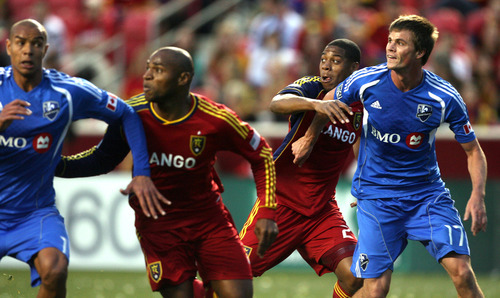This is an archived article that was published on sltrib.com in 2012, and information in the article may be outdated. It is provided only for personal research purposes and may not be reprinted.
Real Salt Lake fans who think that maybe TV play-by-play guy Bill Riley gives the score or the time a bit more often than necessary need to remember one thing.
Riley isn't just the TV voice of RSL, he's also the radio voice.
"It may be a tad more annoying for TV viewers, but I'm trying to keep radio in the back of my head," he said. "I'm probably talking a bit more than if it was just television. I'm probably not talking quite as much as I used to when I just did the straight radio broadcasts."
When RSL's TV deal moved to sister stations KTVX-Channel 4 and KUCW-Channel 30, the decision was made to have Riley and his partner, Brian Dunseth, do both. And, at the same time, they're still heard on KALL-AM 700, aka ESPN 700.
Doing both isn't quite as easy as it looks ... er, sounds. One consistent criticism TV sportscasters receive is that they do indeed talk too much. That they talk even when viewers are perfectly capable of seeing what's happening all by themselves.
It takes some degree of experience, finesse and smarts to know when not to keep quiet.
You can't do that on the radio, obviously. You've got to talk or listeners won't have a clue what's happening.
It's a tough task to keep both audiences happy. To keep either audience happy, for that matter.
But whether you're watching a match on TV or listening to it on the radio, Riley and Dunseth do a fine job of conveying what's going on on the field.
On Saturday night I was unable to watch the Real-Earthquakes game live. I was, however, able to listen to the radio broadcast. At no point did it feel like what was happening was a mystery.
When RSL's Jamison Olave was red-carded, Riley and Dunseth drew a beautiful picture of what happened — that San Jose's Steven Lenhart grabbed Olave's shorts and made it appear he'd been fouled. And that referee Elias Bazakos was out of position and made the call despite not being able to see what actually happened.
Watching a recording of the Channel 4 telecast a few hours later, it was exactly as Riley and Dunseth described it.
(To digress for a moment, TV replays offer a huge indictment of MLS officiating. This isn't the first time the league has looked bad and the ref has looked worse. And while some of the world's top soccer leagues use video replays to rescind red cards when it's clear the ref was wrong, Major League Soccer has never overturned a red card. Under MLS rules, it wasn't even possible until this season. Because, apparently, league officials hope fans will forget if they simply stonewall.)
This isn't the only MLS market that does TV-radio simulcasts. There are a few others, like New England, Kansas City and Dallas.
One of the big reasons there aren't more is that there's no radio in a lot of MLS cities.
"A lot of the major markets don't have English [language] radio," Riley said. "If you go to some of the bigger markets, they've got Spanish language radio but they don't have English radio."
Because ESPN 700 shares ownership with RSL, "We're never going to give up on that," Riley said.
(RSL games are also telecast in Spanish on KTUB AM-1600 and KDUT FM-102.3)
It's another reason Real Salt Lake fans actually have it better than a lot of their MLS counterparts.
Scott D. Pierce covers television for The Salt Lake Tribune. Email him at spierce@sltrib.com; follow him on Twitter @ScottDPierce.



